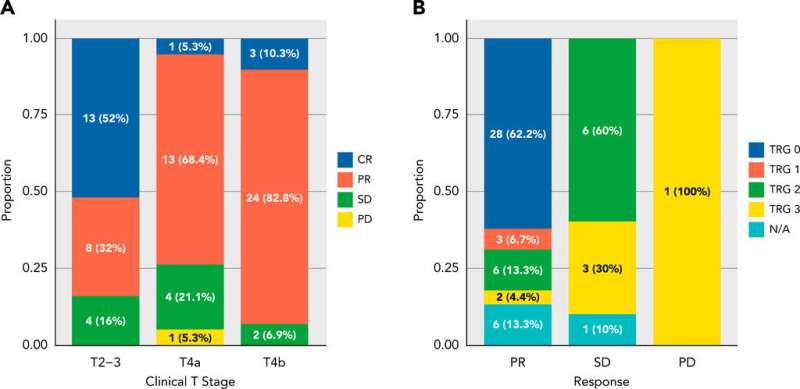This article has been reviewed according to Science X's editorial process and policies. Editors have highlighted the following attributes while ensuring the content's credibility:
fact-checked
proofread
Surgery first for colon cancer? Not so fast, according to new study

New research in the January 2023 issue of Journal of the National Comprehensive Cancer Network finds that immunotherapy from immune checkpoint (PD-1) inhibitors prior to surgery was strikingly effective for patients with localized mismatch repair-deficient or microsatellite instability-high (dMMR/MSI-H) colorectal cancer (CRC).
Nearly all of the patients studied benefitted from neoadjuvant PD-1 inhibitors, with 1-of-4 experiencing complete response on clinical assessment. In addition to the short-term effectiveness, the findings showed substantial longer survival benefits from neodjuvant PD-1 inhibitors, including a low recurrence rate when compared with historic rates.
The researchers—who are based in Southern China—anticipated PD-1 inhibitors could be at least as effective for locally-advanced but operable cancer as they have historically been in the treatment of metastatic dMMR/MSI-H CRC, but were surprised to find it so much more effective for this patient population.
The study included a retrospective review of 73 patients between ages 18 and 75 with confirmed dMMR/MSI-H CRC who received any type of PD-1 inhibitor prior to surgery between October 1, 2017 and December 31, 2021. Of those 73, 48 were diagnosed with colon cancer, 18 with rectal cancer, and 7 with multiple types of CRC. 84.9% overall experienced an objective response, with 23.3% showing complete response and 61.6% partial response.
The 2-year rates for tumor-specific overall survival and disease-free survival were 100% for patients who underwent surgery after PD-1 blockade.
"We need to keep in mind that our final goal is to cure patients long term, not just remove the tumor at the moment," said senior author Pei-Rong Ding, MD, Sun Yat-sen University Cancer Center, State Key Laboratory of Oncology in South China, Collaborative Innovation Center of Cancer Medicine.
"I think care providers, especially surgeons, should refrain from scheduling immediate surgery for patients with locally advanced, or even early-stage dMMR/MSI-H colorectal cancer. With such a powerful option at hand, we have the duty to offer a safer surgery with better outcomes or a non-surgical-yet-equally-effective approach for this group of patients, especially for those who might suffer from function damage or organ sacrifice after surgery."
The study had an average follow-up time of 17.2 months, with 16 patients tracked for more than two years. The researchers call for more studies with an even longer follow-up to confirm these results, especially after treatment ends. There is also more to learn about the long-term safety of this approach and possible implications for limiting or avoiding surgery entirely.
"The treatment of mismatch repair deficient locally-advanced colorectal cancer is a highly active area of research," commented Dustin A. Deming, MD, University of Wisconsin Carbone Cancer Center, Member of the NCCN Guidelines Panel for Colon/Rectal/Anal Cancers, who was not involved in this study.
"This retrospective analysis highlights the potential for significant treatment responses with limited toxicities for these patients treated with immune checkpoint inhibitors. It will be exciting to see how these results, and other completed and on-going studies, will be utilized to incorporate anti-PD1 treatments into the standard-of-care for locally-advanced colorectal cancers."
More information: Bin-Yi Xiao et al, Neoadjuvant immunotherapy leads to major response and low recurrence in localized mismatch repair–deficient colorectal cancer, Journal of the National Comprehensive Cancer Network (2023). DOI: 10.6004/jnccn.2022.7060



















